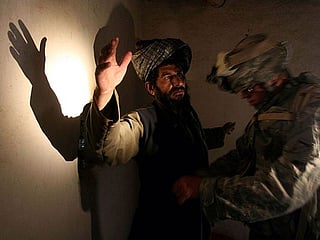Kabul rallies called off after Taliban outlaws protests
Protests would need prior authorisation from the justice ministry

Kabul: Protest organisers cancelled rallies in Kabul on Thursday after the Taliban effectively banned demonstrations, warning violators “will face severe legal action”.
Earlier this week armed men dispersed hundreds of protesters in cities across Afghanistan, including the capital Kabul, Faizabad in the northeast and in Herat in the west, where two people were shot dead.
Late Wednesday, the Taliban moved to snuff out any further civil unrest, saying protests would need prior authorisation from the justice ministry, adding “for the time being” no demonstrations were allowed.
There was a noticeably stronger Taliban presence on the streets of Kabul on Thursday morning as armed men - including special forces in military fatigues - stood guard on street corners and manned checkpoints, according to AFP journalists.
An organiser of a protest outside the Pakistan embassy - where gunmen sprayed shots into the air on Tuesday to disperse a rally - told AFP on Thursday it had been cancelled because of the overnight ban.
At the site of another planned protest in the city, there were no signs of a demonstration.
Promises of inclusion
A Taliban interim government, drawn exclusively from loyalist ranks, formally began work this week with established hardliners in all key posts and no women - despite previous promises of an inclusive administration for all Afghans.
Tuesday night’s announcement of the cabinet was a key step in the Taliban’s consolidation of power, following a stunning military victory that saw them oust the US-backed administration on August 15.
All the top positions were handed to key leaders from the movement and in particular the Haqqani network - the most violent Taliban faction, known for devastating attacks.
Mullah Mohammad Hassan Akhund - a senior minister during the notorious Taliban regime of 1996 to 2001 - was appointed interim prime minister.
Mullah Yaqoob, the son of the Taliban founder and late supreme leader Mullah Omar, was named defence minister, while the position of interior minister was given to Sirajuddin Haqqani, the Haqqani network leader.
Taliban co-founder Abdul Ghani Baradar, who oversaw the signing of the US withdrawal agreement in 2020, was appointed deputy prime minister.
The feared Ministry for the Promotion of Virtue and Prevention of Vice - previously responsible for arresting and punishing people for failing to implement the movement’s restrictive interpretation of sharia - is being reinstated.
Even as the Taliban consolidate power, they face a monumental task in ruling Afghanistan, which is wracked with economic woes and security challenges - including from the Daesh terror group’s local chapter.
Legitimacy must be ‘earned’
US Secretary of State Antony Blinken said any international legitimacy for the Taliban government would have to be “earned”, after leading a 20-nation virtual meeting on the Afghan crisis.
In Germany, Blinken said the ministerial talks were the “starting point for international coordination” on dealing with the Taliban.
Among the countries in the virtual meeting were European allies and historic Taliban backer Pakistan.
“The Taliban seek international legitimacy. Any legitimacy - any support - will have to be earned,” Blinken told reporters.
The European Union said the “caretaker” government failed to honour previous vows of inclusion.
China meanwhile said it welcomed the end of “three weeks of anarchy”, adding it “attaches great importance” to the announcement of an interim government.
Cricket match cancelled
Qatar, the central intermediary between the Taliban and the international community in recent years, said the Taliban had demonstrated “pragmatism” of late.
Former Afghan president Ashraf Ghani, who fled the country as the Taliban entered Kabul, apologised Wednesday to the Afghan people for how his rule ended.
And on Thursday Cricket Australia said it would cancel a historic maiden Test match against Afghanistan unless the Taliban backtracks on a reported ban on women playing sport.
There were other superficial signs of the Taliban tightening their grip.
Images on social media showed the country’s main airport - previously dubbed Hamid Karzai International, after the first post-Taliban president - had been renamed Kabul International.
A public holiday scheduled for Thursday honouring Ahmad Shah Massoud, the famed anti-Taliban resistance fighter assassinated 20 years ago by an Al Qaida suicide squad, was also cancelled.









